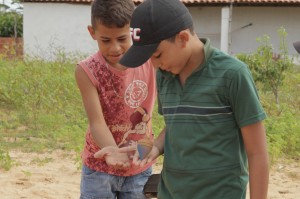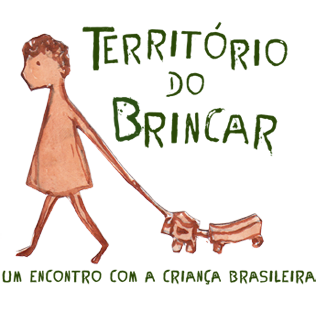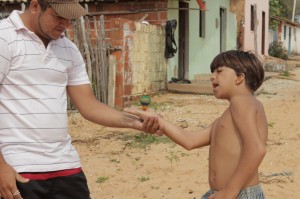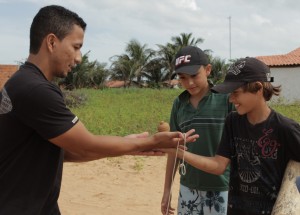May-2015
An exchange of toys and games
The days go by but the kids’ desire to show us what they know remains. When night falls they’ve already surrounded us with suggestions for the morning. “We still haven’t made the spool car,” one of them says. “Why don’t we go hunt crabs in the mangrove?” says another. The list never ends, they really want someone with whom to share, live, play.
They take care of their homework at school or at night, before going to bed. They look for freedom, they don’t want to waste time with anything that is outside their precious lived experiences.
Sometimes I ask myself if we’re not cluttering their life too much with so many games. I listen to the mothers, ask them if it’s OK if they come to our house every day to play with us. “Of course they can. These kids are going to cry and miss you a lot when you leave!” We will miss them just as much.
The exchange is intense, they teach us and we teach them. The repertory we brought in our suitcase spreads out, spilling over the children of other regions. Hopscotch, bicudas, playground games, ways of jumping elastics, string tricks, jacks, songs, jokes, stories… all being distributed back to other childhoods.
The biggest fad here Tatajuba was the top, which had been dormant for a generation of boys between 6 and 14. It started when one of the boys, during his daily round in our house, started playing with some of the toys our sons carry with them, found our bag of tops and asked, “will you show me how to play with this?” It was our cue to create an excellent opportunity for exchange.
David is a master at throwing tops, he learned to play with them in the Amazon and never gave up his addiction. A de facto game hall was set up on our porch. Every day they came here, knowing where the tops are and feeling comfortable enough to spend hours trying them out. Even while we’re having lunch or dinner, working at the computer or putting our kids to sleep, there’s always a small group of children spinning tops or playing with our sons’ other toys. Without having to organize workshops, talks, or getting teachers involved, we are experiencing an intense exchange of toys and games in the most natural way possible, simply by playing together.

The men over 20 are like pros with the tops, making them spin on their hands without touching the ground, and they know every trick of the trade. What broke this cycle? Why didn’t this toy come into the hands of today’s children? No one knows for sure, they just stopped playing. Nowadays, no one has a top and the game fell dormant, lost its power, and never developed its gestures in this new generation.
Just yesterday, the group gathered at our house to learn how to make a “bicuda” (a type of kite made of tissue paper that we learned to make in Acupe, in the state of Bahia). A few days ago they had seen our oldest son flying a bicuda over the soccer field and ran over to ask us: “will you teach us how to make that?” Of course, let’s find some kite lines for everyone, and then come over and we’ll teach you.
On this type of trip it’s important to always carry with you string, kite lines, small knives, a hammer, nails, tops, rubber bands, and sons who like to play with these things. These are the keys for the games to arise naturally.
We showed them the film we made about the boys in Acupe teaching us how to make the bicuda and left the task of teaching how to fold the paper to our son who, at the age of six, knows the value of exchanging play.
Finally, the bicuda has been implemented in Tatajuba and, from now on, the kids here will talk to the kids in Acupe through the free flight of tissue paper rectangles.
People always ask us if the kids in these communities don’t watch TV or play video games. Yes, they play video games and like to watch everything any child likes, but when they meet someone willing to listen to them, to play with them and organize field trips, technology loses its power, leaves center stage, and doesn’t nourish as much as playing. At times this isn’t true, they prefer the TV instead of playing but, here in Tatajuba, playing always wins over this group of kids.
Text: Renata Meirelles
. 0








Leave a Reply